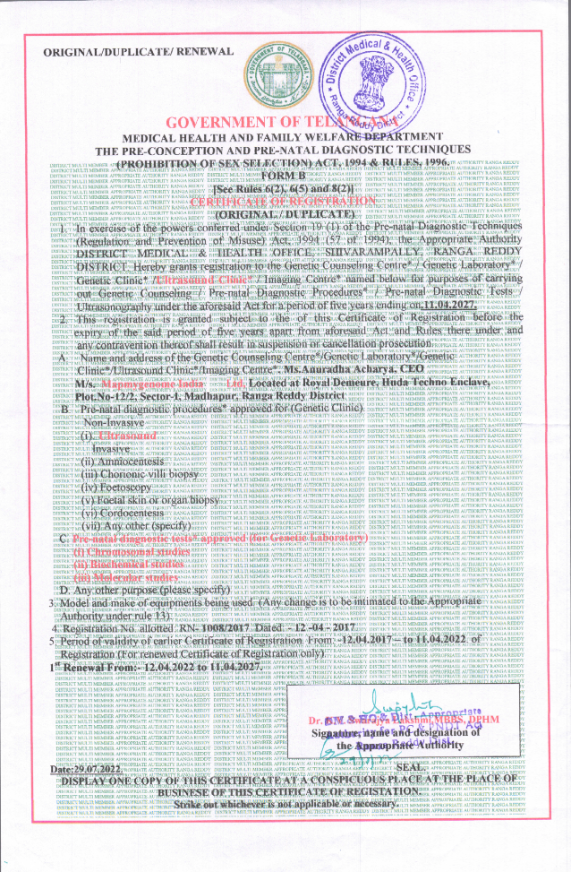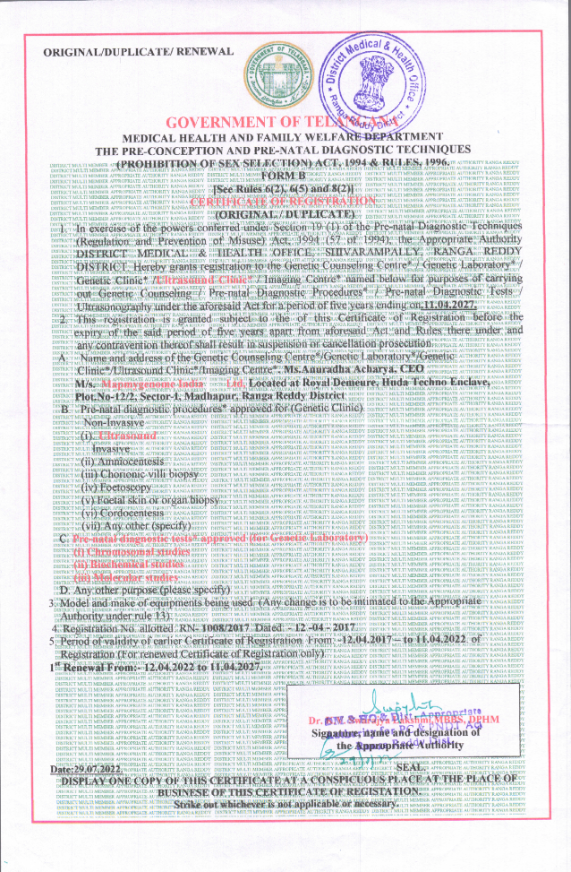क्या आप माता-पिता बनने वाले हैं? बधाई हो! गर्भावस्था के दौरान मिलने वाली सारी खुशी और उत्साह के साथ-साथ कई महत्वपूर्ण विकल्प भी होते हैं—खासकर प्रसवपूर्व आनुवंशिक जांच के मामले में।
आजकल कई भावी माता-पिता के मन में एक बड़ा सवाल होता है:
क्या मुझे एनआईपीटी टेस्ट करवाना चाहिए या पारंपरिक प्रसवपूर्व परीक्षण पर ही निर्भर रहना चाहिए?
आइए इसे आपके लिए सरल बनाते हैं।
प्रसवपूर्व आनुवंशिक जांच क्या है?
प्रसवपूर्व आनुवंशिक जांच से तात्पर्य गर्भावस्था के दौरान किए जाने वाले उन परीक्षणों से है जिनसे यह पता चलता है कि शिशु को कुछ आनुवंशिक स्थितियों या जन्मजात विकारों का खतरा है या नहीं। ये जांच किसी बीमारी का निदान नहीं करतीं—इनसे केवल इस बात की संभावना का पता चलता है कि कोई समस्या हो सकती है।
एनआईपीटी टेस्ट क्या है?
एनआईपीटी का मतलब नॉन-इनवेसिव प्रीनेटल टेस्टिंग है। यह एक भ्रूण डीएनए परीक्षण है जो मां के रक्त के एक साधारण नमूने का उपयोग करके कुछ गुणसूत्र संबंधी स्थितियों की जांच करता है।
यह क्या पता लगाता है?
-
डाउन सिंड्रोम (ट्राइसोमी 21)
-
एडवर्ड्स सिंड्रोम (ट्राइसोमी 18)
-
पटाऊ सिंड्रोम (ट्राइसोमी 13)
-
लिंग गुणसूत्र संबंधी असामान्यताएं (जैसे टर्नर सिंड्रोम या क्लाइनफेल्टर सिंड्रोम)
-
कभी-कभी तो बच्चे का लिंग भी पता चल जाता है।
पारंपरिक प्रसवपूर्व परीक्षण क्या हैं?
इनमें निम्नलिखित परीक्षण शामिल हैं:
पहली तिमाही की स्क्रीनिंग
यह निम्नलिखित का संयोजन है:
-
रक्त परीक्षण
-
नुचल ट्रांसलूसेंसी अल्ट्रासाउंड (बच्चे की गर्दन के पिछले हिस्से में मौजूद तरल पदार्थ की मात्रा मापता है)
ट्रिपल या क्वाड स्क्रीनिंग (दूसरी तिमाही)
इन रक्त परीक्षणों से निम्नलिखित की जांच की जाती है:
-
तंत्रिका नलिका दोष
-
ट्राइसोमी 21 और 18
-
हार्मोन का स्तर जो समस्याओं का संकेत दे सकता है
आक्रामक नैदानिक परीक्षण
यदि जांच में उच्च जोखिम पाया जाता है, तो कभी-कभी निम्नलिखित सुझाव दिए जाते हैं:
-
कोरियोनिक विलस सैंपलिंग (सीवीएस) – लगभग 10-13 सप्ताह में की जाती है
-
एमनियोसेंटेसिस – यह प्रक्रिया गर्भावस्था के लगभग 15-20 सप्ताह में की जाती है।
इनमें गर्भपात का थोड़ा जोखिम होता है क्योंकि इनमें शिशु के आसपास से तरल पदार्थ या ऊतक एकत्र किए जाते हैं।
मुख्य अंतर: एनआईपीटी बनाम पारंपरिक प्रसवपूर्व परीक्षण
| विशेषता | NIPT | पारंपरिक स्क्रीनिंग |
|---|---|---|
| प्रकार | गैर-आक्रामक रक्त परीक्षण | रक्त परीक्षण + अल्ट्रासाउंड |
| समय | 10 सप्ताह से | पहली तिमाही (11-14 सप्ताह), दूसरी तिमाही (15-22 सप्ताह) |
| शुद्धता | डाउन सिंड्रोम के लिए >99% | डाउन सिंड्रोम के लिए लगभग 85% |
| बच्चे को खतरा | कोई नहीं | कोई नहीं (स्क्रीनिंग के लिए) |
| पहचान लेता है | गुणसूत्रीय स्थितियाँ | गुणसूत्रीय + तंत्रिका नलिका दोष |
| क्या गहन अनुवर्ती जांच की आवश्यकता है? | केवल तभी जब परिणाम उच्च जोखिम वाला हो। | अक्सर, यदि परिणाम उच्च जोखिम वाला हो |
| एनआईपीटी परीक्षण की कीमत | उच्च | बीमा द्वारा कवर या कम किया गया |
एनआईपीटी टेस्ट की कीमत क्या है?
एनआईपीटी परीक्षण की कीमत प्रयोगशाला और देश के अनुसार अलग-अलग होती है। भारत में, इसकी कीमत आमतौर पर ₹15000 से शुरू होती है। कुछ उन्नत पैनलों की कीमत अधिक हो सकती है, खासकर यदि उनमें अतिरिक्त गुणसूत्र या सूक्ष्म विलोपन परीक्षण शामिल हों।
बीमा कवरेज भी अलग-अलग होता है। बुकिंग करने से पहले हमेशा अपने बीमा प्रदाता से संपर्क करें।
अधिक माता-पिता एनआईपीटी क्यों चुन रहे हैं?
-
उच्च सटीकता – कम गलत परिणाम मतलब कम तनाव
-
पहले परीक्षण – 10 सप्ताह की शुरुआत में ही मन की शांति पाएं
-
कोई खतरा नहीं – चूंकि यह एक साधारण रक्त परीक्षण है, इसलिए शिशु को कोई नुकसान नहीं है।
-
लिंग का खुलासा - कुछ माता-पिता अपने बच्चे का लिंग जल्दी जानना पसंद करते हैं (यदि वे ऐसा चुनते हैं)।
आपको एनआईपीटी कब करवाना चाहिए?
एनआईपीटी सभी गर्भवती महिलाओं के लिए अनुशंसित है, लेकिन विशेष रूप से तब जब:
-
आपकी उम्र 35 वर्ष या उससे अधिक है।
-
परिवार में आनुवंशिक विकारों का इतिहास है।
-
पारंपरिक परीक्षणों में आपके परिणाम असामान्य आए थे।
-
आपकी पिछली गर्भावस्था में गुणसूत्र संबंधी असामान्यताएं थीं।
-
आप पहले और अधिक सटीक स्क्रीनिंग चाहते हैं
क्या मैं एनआईपीटी और पारंपरिक दोनों परीक्षण करवा सकता हूँ?
जी हाँ। कुछ डॉक्टर शिशु के स्वास्थ्य की व्यापक जानकारी के लिए एनआईपीटी को अल्ट्रासाउंड के साथ मिलाकर कराने की सलाह देते हैं। उदाहरण के लिए:
-
एनआईपीटी और फर्स्ट ट्राइमेस्टर स्कैन से आपको आनुवंशिक और संरचनात्मक जानकारी मिलती है।
-
एनआईपीटी के बाद एनोमली स्कैन (लगभग 18-22 सप्ताह) से शारीरिक असामान्यताओं का पता लगाया जा सकता है।
प्रसवपूर्व परीक्षण चुनने से पहले उपयोगी सुझाव
-
अपने डॉक्टर से बात करें – हर गर्भावस्था अलग होती है
-
अपने जोखिम को जानें – उम्र, पारिवारिक इतिहास और पिछली गर्भावस्थाएं मायने रखती हैं
-
अपनी बीमा पॉलिसी की जांच करें – एनआईपीटी का खर्च आंशिक या पूर्ण रूप से कवर हो सकता है।
-
टेस्ट कवरेज के बारे में पूछें – कुछ एनआईपीटी टेस्ट दूसरों की तुलना में अधिक स्थितियों की जांच करते हैं।
-
किसी प्रमाणित प्रयोगशाला का चयन करें – सटीकता महत्वपूर्ण है, खासकर भ्रूण डीएनए परीक्षणों के मामले में।
अक्सर पूछे जाने वाले प्रश्न: एनआईपीटी परीक्षण बनाम पारंपरिक प्रसवपूर्व परीक्षण
क्या एनआईपीटी पारंपरिक परीक्षणों से बेहतर है?
जी हां, सटीकता के मामले में। डाउन सिंड्रोम जैसी गुणसूत्र संबंधी स्थितियों का पता लगाने में एनआईपीटी की दर काफी अधिक है।
क्या एनआईपीटी अल्ट्रासाउंड का विकल्प है?
नहीं। अल्ट्रासाउंड शारीरिक विकास की जांच करता है, जबकि एनआईपीटी गुणसूत्रों की जांच करता है।
क्या एनआईपीटी 100% सटीक है?
नहीं, ऐसा बिल्कुल नहीं है। यह बहुत सटीक है (डाउन सिंड्रोम के लिए 99% से अधिक), लेकिन यह निदान का परीक्षण नहीं है। सकारात्मक परिणामों की पुष्टि हमेशा सीवीएस या एमनियोसेंटेसिस से की जानी चाहिए।
क्या एनआईपीटी तंत्रिका नलिका दोषों का पता लगा सकता है?
नहीं। इसके लिए आपको दूसरी तिमाही का स्कैन या रक्त परीक्षण करवाना ही पड़ेगा।
मैं एनआईपीटी कब करवा सकती हूँ?
आप गर्भावस्था के 10वें सप्ताह से ही इसका सेवन शुरू कर सकते हैं।
क्या एनआईपीटी सुरक्षित है?
बिल्कुल। यह गैर-आक्रामक प्रक्रिया है और मां और बच्चे दोनों के लिए सुरक्षित है।
अंतिम विचार
एनआईपीटी और पारंपरिक प्रसवपूर्व परीक्षणों में से चुनाव आपकी ज़रूरतों, प्राथमिकताओं और चिकित्सीय पृष्ठभूमि पर निर्भर करता है। यदि आप प्रारंभिक, सटीक और सुरक्षित स्क्रीनिंग चाहते हैं, तो एनआईपीटी एक बेहतरीन विकल्प है।









